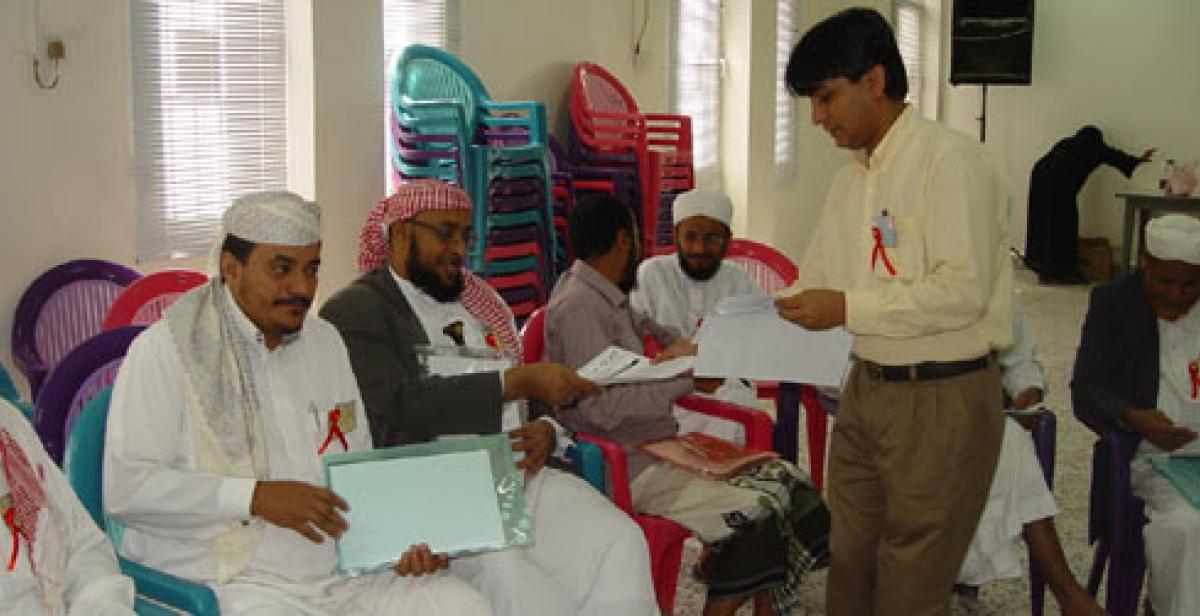Irfan, an indian national (standing), in a training of religious leaders (Imams) on HIV and AIDS, in Hodeidah, Yemen.
What have you done since leaving Progressio and what do you do currently?
After working with Progressio as a HIV and AIDS Coordinator, I started a new journey in my career with the United Nations Development Programme (UNDP) in Yemen as Monitoring and Evaluation Specialist. Currently, I am working as a Monitoring and Evaluation Specialist with the United Nations Children's Fund (UNICEF) in the Democratic People's Republic of Korea (North Korea) for Global Fund grants.
Please describe your role and the partner organisation that you worked with as a Progressio development worker
My role as a development worker in Yemen was to maintain overall coordination for designing, implementing and monitoring Progressio’s HIV and AIDS programme. The main aim of my placement was to build the capacities of civil society and faith-based organisations to respond to HIV and AIDS in Yemen. The partner organisations that I was placed with were involved in working with religious leaders, the media, building the capacity of civil society organisations on HIV and AIDS, and working with people living with HIV.
What inspired you to become a development worker?
What inspired me to join was Progressio’s approach to working with local civil society organisations, communities and governments through skill-sharing and capacity building.
What did you enjoy most about your role, and of your experience as a development worker?
I enjoyed each and every day, as Progressio extends all possible support and freedom to development workers to envisage, innovate, implement and replicate the best practices to bring change in people’s lives. The most important thing which I enjoyed in Yemen as a development worker was to work with religious leaders and people living with HIV.
What were some of your main achievements while working as a development worker?
Some of my key achievements included:
- Building partnerships with civil society organisations and working with them to implement a small grant project on HIV and AIDS prevention through community based intervention, including peer education among the youth, and high risk behaviour groups including female sex workers, truckers, fishermen and refugees.
- Working with faith-based organisations and increasing the participation of religious leaders (mosque’s Imams and preachers) in responding to HIV and AIDS to reduce stigma and discrimination against people living with HIV.
- Developing cultural and gender sensitive training modules, methodology, resource materials and strategy papers.
- Working with organisations of people living with HIV to strengthen their ability to plan and implement responses to HIV, thereby facilitating access to treatment and care for people in Yemen living with HIV.
- Building the skills of local Yemeni media to play a greater role in raising awareness about HIV and creating an enabling environment for people living with HIV.
- Contributing to develop a proposal for working with young people on HIV issues, and mobilising international funding from Irish Aid and local funding from UNICEF in Yemen.
And what were some of the key challenges and lessons learnt?
In Yemen we worked with six partner organisations in the HIV and AIDS programme. Participating in and implementing the programme had significant financial implications for them. Sometimes the partners expected that Progressio, being an international NGO, would be able to provide them with financial support. So it was important to explain from the very beginning that Progressio does not provide money but provides skills and experiences to help them build their own capacity. I feel that the agencies providing financial support to Progressio must have a long term commitment to Progressio’s work so that we can keep the promises made to the people and communities of Yemen.
Did this experience change you as a person in any way? If so in what way?
Indeed, working with Progressio as a development worker has allowed me to increase my knowledge, improve my experience and expand my horizons with regards to thinking and learning.
Did your experience as a development worker influence your career/ future direction, and help you to get to where you are today? If so, how?
The experience of working with Progressio has positively enhanced my career prospects. It gave me an international working experience, which allowed me to acquire new skills, work in a multicultural setting and understand global development perspectives and challenges.
What advice would you give to someone who is thinking of becoming a development worker?
Progressio is a true skill-share organisation and extends all possible support to development workers to grow professionally.



